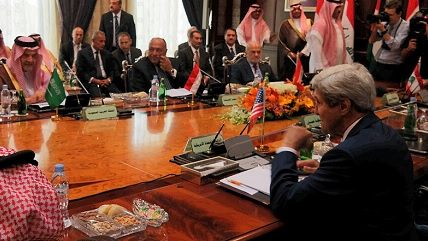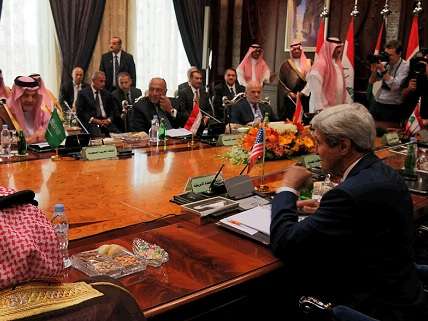It Begins: U.S. Action Against ISIS Lets Regional Powers Off the Hook to Do Anything About Their Own Security


The Islamic State in Iraq and al-Sham (ISIS) controls large swaths of territory in Iraq and Syria and aims to control even more of the Levant (al-Sham: ranging from Turkey to the Sinai). It threatens the security of every government in the region. It has no allies and respects no sovereignty. The leaders of ISIS, in fact, declared that their organization was a caliphate, with jurisdiction over Muslims everywhere in the world. So while the U.S. government acknowledges ISIS does not pose a threat to the homeland, the terror group certainly poses a threat to homelands in the Middle East.
Yet yesterday's announcement by President Obama of a not-war being launched agains ISIS in both Iraq and Syria has given regional Arab powers the room not to do anything. Secretary of State John Kerry was in the region to drum up support for planned U.S. military actions, appearing at a summit of Arab foreign ministers in Saudi Arabia. Here's what happened, according to The New York Times:
None of the Arab participants said precisely what they would do, and it remained unclear whether any would join the United States in mounting the airstrikes.
Turkey also took part in the meetings here, but it did not sign the communique. A senior State Department official sought to minimize the significance of that development, saying the United States would continue to consult with Turkish officials on how to respond to the threat posed by ISIS, which has captured 49 Turkish diplomats in Iraq and held them hostage.
Countries like Turkey and Saudi Arabia have given varying degrees of support to the virulent strains of Islam that feed extremists like those in ISIS. Yet ISIS is hardly a puppet. Whether they decide to move north to Turkey or south to Saudi Arabia will be a decision over which those two countries will likely have no influence. But why bother treating ISIS like a national security threat when the United States is doing it for you?
Saudi Arabia, Turkey, other nations in the region, Arab and otherwise, are all threatened by ISIS in a way the United States isn't, and in a way I think their leaders intrinsically understand they're not being threatened by other countries in the region despite the official propagandas. Though the U.S. is the worldwide leader in military spending, these countries have spent decades building their militaries. They ought to make the decision to use them or not, to work with other countries in the region or not, and not have those decisions deferred by U.S. action from afar.
Editor's Note: As of February 29, 2024, commenting privileges on reason.com posts are limited to Reason Plus subscribers. Past commenters are grandfathered in for a temporary period. Subscribe here to preserve your ability to comment. Your Reason Plus subscription also gives you an ad-free version of reason.com, along with full access to the digital edition and archives of Reason magazine. We request that comments be civil and on-topic. We do not moderate or assume any responsibility for comments, which are owned by the readers who post them. Comments do not represent the views of reason.com or Reason Foundation. We reserve the right to delete any comment and ban commenters for any reason at any time. Comments may only be edited within 5 minutes of posting. Report abuses.
Please to post comments


Garnish their United States foreign aid checks for the cost.
Garnish them with what - parsely?
Ohhhhhhhhhhhh, you mean, yeah....never mind....
Joe'z Law....derp!
My guess is they want Saudi Arabia first. Hard to be a Caliphate without controlling Mecca and Medina. Oil fields are juicy bonus.
Then the moderate Muslims can launch their own Crusades!
I don't doubt that the rank and file is desirous of that end, but I can't imagine that it's leadership is that foolish. The one thing that ISIS could do to provoke a massive backlash is to destabilize Saudi Arabia. (Kind of to the point of the post.)
America, fuck yeah!
I don't know what to do about ISIS. I have been to Pakistan and several of the surrounding countries as a western engineer though, FWIW. I'm talking about 8 hours of training to understand the difference between a plus and minus screwdriver and then having the tools stolen come morning. The West is its own worst enemy.
I'm talking about 8 hours of training to understand the difference between a plus and minus screwdriver and then having the tools stolen come morning.
Please, any other anecdotes?
They have spent decades buying equipment and oppressing their populations maybe, but there is a lot more to building a military, as we have just witnessed in Iraq.
I think that the key reason that these ME states refuse to get involved is the fear that their security forces will for a variety of reasons, dissolve if they are pressed into combat with ISIS or entities like it.
They will engage as an absolute last resort.
Or they're afraid they won't dissolve, because they've already been infiltrated.
For one thing, Qatar and various Saudis could stop funding them. And by "stop" I don't exclude the option of particular residences in those countries being destroyed in mysterious explosions.
We could just bribe the Filipino pool boy to turn the Sultan's water off.
The whole underpaid/mistreated guest worker category does seem to be an obvious source of intel. I wonder if the CIA is bright enough to take advantage of that.
I think you answered your own question.
Look, what brings in more money and manpower to the empire, paying the poolboy or launching satellites, Echelon, and data-mining?
These agencies do what is effective at attaining the agency's goals - which are to increase the power and prestige of the people running the agency.
Public choice theory.
Until we run into an actual *existential threat*, where its perform or die, these people will just keep farting around the ME killing random people and crowing about what heroes they are.
Underpaid? Wages are determined by the market. They aren't underpaid they get exactly what the market bears.
I've read that Saudi Arabia is expelling its guest workers by the millions. But at the end of the day they will need outside help to run their infrastructure. The Chinese will do it.
The leaders of ISIS, in fact, declared that their organization was a caliphate, with jurisdiction over Muslims everywhere in the world.
Who are we to say they're not?
Well, the vast vast majority of Muslims simply laughed at that statement. It's evidence of delusional thinking more than anything else.
I laughed too, but you have to admire their moxy.
The funny (not really) part is that they claim jurisdiction and are mostly ignored outside ISIS.
The US claims jurisdiction on Americans the world over and countries are pissing themselves to facilitate the tyranny du jour.
The important thing is that Assad and Iran don't have to worry about it.
IOW, the Arab middle eastern nations are taking a page from Europe's cold war playbook: don't bother defending yourself when the Americans will do it for you.
It has no allies
I wouldn't be so sure when it comes to Arab princes and sheiks and stuff.
Roll that beautiful bean footage.
http://www.Crypt-Tools.tk